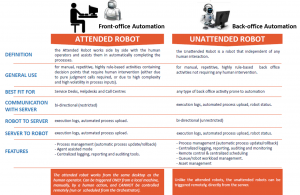Home » Roadmap for Robotic Process Automation: how to get intelligent bots to work?
Roadmap for Robotic Process Automation: how to get intelligent bots to work?
By vVolve

Roadmap for Robotic Process Automation: how to get intelligent bots to work?
Last week, MSIG Insurance announced that their two new bots, Zac and Velma, will cut processing time for travel claims registration and motor fleet policy by 70% and 80% respectively, and eliminate error rates by 100%. While MSIG is not the first insurer to digitize their processes using Robotic Process Automation (RPA), FWD and AIA, as well as banks like UOB have also done so, they remind us once again of the potential efficiency gains possible.
After publishing my previous article, clients have asked two questions. How can bots like Zac and Velma become so intelligent that they can be digital employees? And, how do I get my organization to that stage?
Types of bots and how they become intelligent
There are, in general, two types of bots: the Attended robot and the Unattended robot. The Attended robot typically works side-by-side with human operators and assists in completing processes. They are typically deployed in the front office and are suitable for service desks, helpdesks, call centres and other customer facing tasks.
The Unattended robots, on the other hand, typically works without any human interaction, and, hence, are typically deployed in the back office. They are suitable for manual, repetitive and highly rule-based tasks.

Both types of bots become intelligent when we apply artificial intelligence and digital technologies. At the most basic level (Level 1), RPA works with structured data and repetitive recurring processes. This is similar to the traditional scripting and batch processing that we are familiar with.
To move to Level 2 RPA, we apply Natural Language Processing (NLP) and Machine Learning (ML) techniques to enable the bots to read and understand unstructured messages, as well as make decisions based on what it has learned from historical data.
At Level 3 RPA, the bots are integrated with digital platforms or solutions that enable Straight Through Processing (STP) without changes to core systems. This means faster processing time, minimal manual interventions and, most importantly, enhanced customer satisfaction through the digital experience. One example is the use of Google Word Vector to apply Artificial Intelligence to assist in shortlisting the candidates to consider by matching a job description to tons of candidate profiles. This is a combination of digital technologies with RPA to simplify the HR Recruitment process.
Getting to intelligence with vVolve’s 6-step RPA journey
As bots get more sophisticated and require more cutting edge technologies, the implementation journey now also needs to be more thoughtful and carefully planned to capture the ROI we expect.
At vVolve, we use a 6-step RPA implementation process that starts with Educate and Identify, so that clients fully understand the value of RPA and identify the right processes that can deliver that value. Once Proof of Concept and Pilot are completed, the value of RPA is proven for the client, we move to Ramp-Up and Institutionalize where clients establish the skills to deploy and run RPA as business-as-usual.
We believe that by starting simple before evolving fully to embrace RPA, clients can fully reap the ROI on a sustainable basis.
Archives
- March 2024 (1)
- January 2024 (1)
- October 2023 (4)
- September 2023 (1)
- June 2023 (3)
- May 2023 (5)
- April 2023 (1)
- August 2021 (1)
- July 2021 (1)
- October 2020 (3)
- February 2020 (1)
- December 2019 (1)
- December 2018 (1)
- October 2018 (1)
- September 2018 (1)
- August 2018 (2)
- July 2018 (2)
- March 2018 (1)
- April 2017 (1)
- October 2016 (1)
- September 2016 (2)
- August 2016 (2)
- July 2016 (2)
- June 2016 (1)
- May 2016 (2)
- April 2016 (2)
- March 2016 (2)
Latest Articles
Harness the Power of Cloud ERP
Companies that are taking advantage of the cloud are the ones leading in their field. Their strategic actions often give them a competitive advantage and help them market share by improving customer experiences.
How vVolve & SAP EWM Can Help Your Warehouse Reach Its Full Potential?
Discover how vVolve with SAP EWM can help address challenges in Warehouse Operations which is an important area in supply chain and which requires extensive cross functional cooperation between purchasing, manufacturing, sales, transportation, workforce management departments.
Discover how Application Management Solutions (AMS) can enhance SAP performance and reliability. Explore proactive monitoring, scalability, cost efficiency, improved security, regular updates, enhanced user experience, and business continuity.
SAP HANA On-Premise Migration: Best Practices and Considerations
Explore the best practices and essential considerations for a seamless SAP HANA on-premise to cloud migration. Learn how to assess your current environment, define clear objectives, plan infrastructure, backup data and ensure version compatibility.





